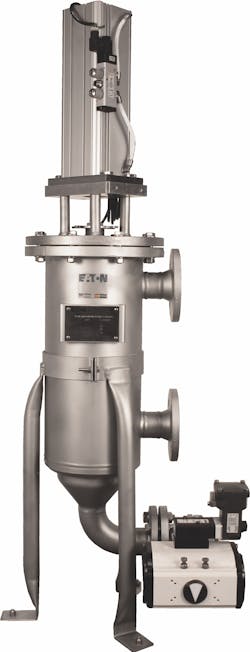About the author: Rick Jacobs is president of Eaton’s Filtration Div. Jacobs can be reached at 732.212.4700.
Based on the harmless appearance of a bagel, it is hard to imagine that making these popular treats may, in fact, pose an occasional hazard. But it does, according to officials at a Canadian bread manufacturing company based in Toronto, Ontario. Used extensively in the bagel making process, highly pressurized hot water required during boiling offsets potential quality problems. The process also requires a filtration system to clean discarded ingredients like raisins, sesame seeds, bits of dough, cornmeal and other materials out of the hot water. That is where the danger can occur.
The company was using duplex bag filters for several years and was concerned about employee safety because of the hazards associated with manually changing filter bags while working with the high water temperatures.
The bread company planned to install a new bagel boiler in its Alberta, Canada, plant and required a filtering system to clean the recycled boiler water of ingredients. Cornmeal can create water quality problems if the temperature falls, requiring an expensive and time-consuming water change. It is critical that the water in a bagel boiler remains at a high temperature, even as it is filtered and recycled.
With employee safety in mind, the maintenance supervisor at the company’s Alberta plant wanted a filtering system that required less operator intervention than a bag system. High water temperatures used in the process can be a serious hazard to an operator changing filter bags, especially when pressed for time during the shutdown process, when an operator may open up the filter housing while it is still pressurized.
According to the U.S. Center for Disease Control and Prevention (CDC) website, workers exposed to conditions of extreme heat in the workplace may be at risk of developing heat stress. Continued exposure to high levels of heat can result in occupational health issues and injuries such as burns from hot surfaces or steam, heatstroke, heat exhaustion or heat rashes. The CDC site goes on to say that working in conditions of extreme heat, like those of the bagel making process, also can increase the hazards workers may experience like fogged-up safety glasses and dizziness.
“Safety in the workplace is the joint responsibility of the entire workforce of an organization,” said Richard Jacobs, president of Eaton’s Filtration Div. “At Eaton, we are committed to improving employee safety and reducing energy, water use and waste generation. We work with organizations around the world every day to help attain these goals.”
A Safer Solution
Decision-makers at the Alberta plant wanted a filter they could count on, without the hazards occasionally associated with bag filter maintenance. Working with Eaton, the plant manager and maintenance supervisor determined that the Eaton DCF mechanically cleaned filter was the solution to meet their business objectives. The plant installed two DCF-800 filters on the boiler water recycle line at the Alberta facility. DCF filters successfully removed the ingredients that would adversely affect the final product. Uninterrupted filtering by the DCF also ensured consistently high water temperatures required to maintain boiler water quality.
The DCF filter performs a self-cleaning action by mechanically scraping collected debris from the filter screen with a disc that travels up and down the screen, parallel to the liquid flow. The collection chamber at the bottom of the filter automatically purges collected debris without halting production, in a process that takes less than seven-tenths of a second. Because the DCF filter continuously cleans the screen without interrupting production, it maintains a consistently high flow rate and provides the highest quality filtering. In addition, this filter collects and discharges only the contaminants, not a filter bag or cartridge loaded with valuable product.
The Alberta facility has eliminated the risk of operator injury related to changing filter bags because there are no bags to remove and media cleaning is automatic.
The facility’s supervisors were impressed with the unsurpassed filtering of its bagel boiler water, the ability to a maintain high water temperature, and avoid water quality problems. Meanwhile, the plant is realizing financial and environmental gains by eliminating media, reducing worker exposure, and reducing labor and disposal costs.
In fact, the company was so satisfied with the performance of the DCF filters at the Alberta plant that it installed them in its Langley, British Columbia, facility’s bagel boiler systems—instead of previously planned bags.
Download: Here
